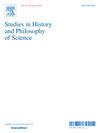欧几里得严谨性与(缺失的)反射角奇案
IF 1.8
2区 哲学
Q1 HISTORY & PHILOSOPHY OF SCIENCE
引用次数: 0
摘要
我研究了欧几里得的《圆周率》中一个已知的因欧几里得不认识反射角而导致的概括不足的案例。托马斯-希斯爵士(1956 年)认为欧几里得的概括不足是由于他缺乏意识,我对这一评价提出异议。不认识反身角还导致普罗克洛斯的四边三角形违反了三角形的基本属性。我证明这些问题是可以解决的。然而,欧几里得为什么不承认反射角的问题依然存在。我认为最好的解释是欧几里得是出于严谨的考虑。我认为,奈茨(Netz,1998,2003 年)所阐述的图解在希腊数学中的命题作用,以及欧几里得关于感官知觉可靠性的观点,都对如何在《圆数学》中使用图解施加了重要的表征限制。我的研究表明,《元素》中缺失的反射角和精心制作的定义证明,表征约束确实得到了一丝不苟的遵循,甚至付出了明显的代价。我认为,对缺失反射角的其他解释是站不住脚的。总之,欧几里得意识到图表的局限性,并在其局限性范围内努力工作,以保持严谨性。本文章由计算机程序翻译,如有差异,请以英文原文为准。
Euclidean rigor and the curious case of the (missing) reflex angle
I examine a known case of undergeneralization in Euclid's Elements arising from Euclid's non-cognizance of the reflex angle. Sir Thomas Heath (1956) attributed the undergeneralization to Euclid's lack of awareness, an assessment that I dispute. Non-recognition of reflex angles also leads to Proclus' four-sided triangles which violate an essential property of triangles. I show that these issues are resolvable. However, the question as to why Euclid did not acknowledge the reflex angle remains. I claim that the best explanation is that Euclid was guided by reasons of rigor. I argue that the propositional role of diagrammata in Greek mathematics as expounded by Netz (1998,2003) and Euclid's view of the reliability of sense perception impose a crucial representational constraint that governs how diagrams could be used in the Elements. I show that the missing reflex angle, and the careful crafting of definitions in the Elements are evidence that the representation constraint was indeed meticulously followed, even at apparent cost. I argue that alternative explanations for the missing reflex angle are not tenable. In sum, Euclid was aware of the limitations of diagrams, and worked assiduously within their limitations to preserve rigor.
求助全文
通过发布文献求助,成功后即可免费获取论文全文。
去求助
来源期刊

Studies in History and Philosophy of Science
管理科学-科学史与科学哲学
CiteScore
2.50
自引率
10.00%
发文量
166
审稿时长
6.6 weeks
期刊介绍:
Studies in History and Philosophy of Science is devoted to the integrated study of the history, philosophy and sociology of the sciences. The editors encourage contributions both in the long-established areas of the history of the sciences and the philosophy of the sciences and in the topical areas of historiography of the sciences, the sciences in relation to gender, culture and society and the sciences in relation to arts. The Journal is international in scope and content and publishes papers from a wide range of countries and cultural traditions.
 求助内容:
求助内容: 应助结果提醒方式:
应助结果提醒方式:


